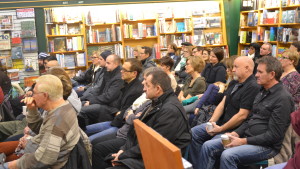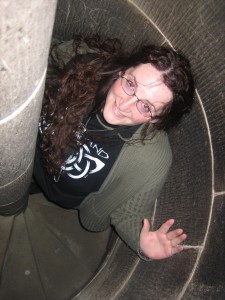 On the evening of November 7, a small group of readers gathered at my parents’ home to hear the first reading from my new book, The City of Darkness. This was the pre-launch, and it was reserved not for close friends but rather the people who had responded the strongest to the first novel in my ongoing series, which had been released two years earlier. (An unconscionably long gab between books, by the way, but that’s a subject for a different post.)
On the evening of November 7, a small group of readers gathered at my parents’ home to hear the first reading from my new book, The City of Darkness. This was the pre-launch, and it was reserved not for close friends but rather the people who had responded the strongest to the first novel in my ongoing series, which had been released two years earlier. (An unconscionably long gab between books, by the way, but that’s a subject for a different post.)
It was an interesting mix, to say the least. If I had merely invited close friends and family, this would have been a very different sort of evening from what it turned out to be. We would have snacked and visited… and yes, had a few drinks. We would have talked a little bit about the book, I would have shown them the cover art, and then we would have moved on to other subjects. It would have been comfortable.
Not that it wasn’t comfortable. It certainly turned out that way. But this was a combination of people unlikely to get together for any reason except to discuss my book. Over wine and cheese, they peppered me with insightful questions about the plot and characters, about where the story was heading, about how many books I would publish in the series and when they would be released. It was heady and strange.
At some point in the evening, one of the guests sidled up to me and remarked, “How does it feel to have your own fan club?” I smiled politely and waved her off. This was no fan club. A book club, kind of, but a fan club? Movie stars have fans. J.K. Rowling has fans. Me? I have a few readers, sure, but…
Thankfully, I knew better than to say any of this out loud. As I walked away, I realized how wrong I was. My self-deprecating side had shown up right on cue to downgrade the compliment, but the more I thought about it, the sooner I realized that these were my fans. And all I had done to accumulate them was write a book, and then another book. Some of these people had known me for years, and others I really didn’t know at all, but they all had one thing in common—their appreciation for my writing.
It hit me like a ton of bricks. What a powerful gift it is to have readers—and not just any readers, but sharp and intelligent and engaged readers.
Well, my fan club is small, but I am so grateful for what they have given me. It’s now impossible to do any kind of writing without thinking about them, and the thought of them spurs me to write faster. And hopefully better. When I’m sitting on the couch watching TV, the thought invariably occurs: I should be writing. These people are waiting for me, and I shouldn’t make them wait a moment longer than necessary.
Just two nights ago, all of my marketing efforts culminated in my actual launch. It was held about forty-five minutes away from the small town where I live, at a big bookstore. I had worked hard to ensure an exciting turnout. My fans, too, were exerting a lot of pull to draw people in. Sometimes I couldn’t believe that they were willing to do all this legwork for me, but nonetheless, the work got done, and I could sense that the launch was going to be a big success.
When I woke up on Wednesday morning, all ready to do my final preparations—practice my reading, gather my notes, decide what to wear, etc.—I heard the sound of a keening wind outside my bedroom window. My heart began to race as I ran to the front door and looked outside. Snow, snow, everywhere snow. There was a storm advisory. More than a foot of snow had already accumulated on my driveway, and I knew it would be hopeless to try backing out of the garage through it. Worse: I knew it might be hopeless to drive forty-five minutes through open countryside to get to my launch. Even worse: Assuming I could get there, would anybody else brave the trip?
Over the day, the emails and Facebook messages poured in: “So sorry, Evan. I was planning to come, but I’m snowed in! Good luck this evening!” After about a dozen of those, I was good and truly discouraged. I wanted to hide in a dark corner and just forget the whole thing. How embarrassing it was going to be to venture into this big venue and sit in an empty room after months of preparation.
But I practiced my reading, anyway. I gathered my notes. I decided what to wear. And I made the drive, though it took a bit longer than usual. Certainly, the turnout would be down from what I had anticipated. I feared being alone. I feared being a complete failure.
Well, the turnout was down from my original expectations. Down by two-thirds. Maybe more. But something wonderful also happened. As the minutes ticked by and I waited nervously, people started to arrive. First just a handful, then a dozen, then two dozen. Three dozen. Four. On an evening when I didn’t think anyone would care enough to brave some of the harshest winter conditions imaginable, more than fifty people came. And among them were so many members of that fan club—not to mention many new members, who will surely be invited to my next pre-launch soiree. A few feet of snow, high winds, and barely navigable roads weren’t enough to stop them from having to wait even one more day to read my book.
Talk about humbling!
I’ve often said that writing is reward enough. If need be, I would write for the sole purpose of entertaining myself. I’ve said those things and I will continue to say them. But as of today, I can say a new thing: from now on, I don’t have to write just for myself. I’ve got a fan club—and they have my back.

